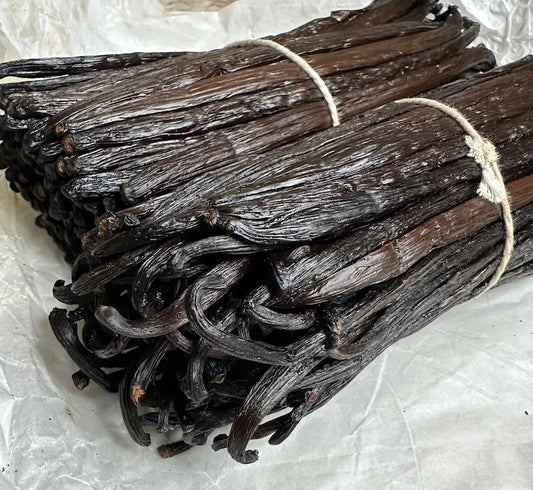IS ORGANIC VANILLA EXTRACT REALLY BETTER? EXAMINING THE PROS AND CONS
When it comes to baking ingredients, vanilla extract is a staple in most kitchens. Its rich, sweet aroma and flavor are essential for countless recipes, from cookies and cakes to custards and ice creams. However, as the demand for organic and natural products continues to grow, many people are left wondering: Is organic vanilla extract worth the higher price tag?
In this blog post, we'll delve into the world of vanilla extract, exploring the differences between organic and conventional varieties, examining the potential benefits and drawbacks of each, and ultimately helping you decide whether organic vanilla extract is a worthwhile investment for your baking needs.
Understanding Vanilla Extract
Before we dive into the organic versus non-organic debate, let's first understand what vanilla extract is and how it's made. Vanilla extract is a liquid flavoring derived from the cured seed pods of the vanilla orchid plant. The pods are soaked in a mixture of water and alcohol (typically vodka or rum) for an extended period, allowing the vanilla's natural flavors and aromas to infuse into the liquid.
Conventional Vanilla Extract
Most vanilla extracts found in grocery stores are non-organic, meaning the vanilla beans used in their production were grown using conventional farming methods, which may involve the use of synthetic pesticides, fertilizers, and other chemicals. These conventional extracts are generally more affordable and widely available.
Organic Vanilla Extract
Organic vanilla extract, on the other hand, is made from vanilla beans that were grown without the use of synthetic pesticides, herbicides, or fertilizers. Additionally, the alcohol used for extraction must also be certified organic. Organic vanilla extract is typically more expensive than its conventional counterpart due to the higher production costs associated with organic farming practices.
The Pros of Organic Vanilla Extract
- No Pesticide Residues: One of the primary advantages of organic vanilla extract is the absence of pesticide residues. Conventional vanilla beans may contain trace amounts of pesticides, which can be a concern for those seeking to minimize their exposure to synthetic chemicals.
- Environmental Sustainability: Organic farming practices are generally considered more environmentally friendly and sustainable than conventional methods. By choosing organic vanilla extract, you're supporting farming practices that promote soil health, biodiversity, and water conservation.
- Potential Flavor Enhancement: Some proponents of organic vanilla extract claim that it has a richer, more pronounced flavor compared to conventional varieties. This is attributed to the absence of synthetic chemicals during the growing and curing processes, allowing the natural flavors of the vanilla bean to shine through.
The Cons of Organic Vanilla Extract
- Higher Cost: Organic vanilla extract is typically more expensive than its non-organic counterpart, sometimes significantly so. The higher price tag is due to the increased labor and production costs associated with organic farming and certification.
- Limited Availability: The supply of organic vanilla beans can be limited, which can lead to shortages and inconsistent availability of organic vanilla extract in some areas or during certain times of the year.
- Flavor Differences May Be Negligible: While some claim that organic vanilla extract has a superior flavor, many bakers and chefs argue that the flavor differences between organic and non-organic varieties are minimal and may not be distinguishable to the average consumer.
Factors to Consider
When deciding whether to invest in organic vanilla extract, there are several factors to consider:
- Personal Preferences: If you prioritize consuming organic and natural products, or if you have concerns about pesticide exposure, organic vanilla extract may be the right choice for you, regardless of potential flavor differences.
- Cost and Budget: Organic vanilla extract can be significantly more expensive than conventional varieties. Consider your budget and how much you're willing to spend on this ingredient.
- Availability: Depending on where you live, organic vanilla extract may be difficult to find or consistently available. If this is the case, you may need to plan ahead or consider online ordering options.
- Intended Use: For professional bakers or those who rely heavily on vanilla extract for their recipes, the potential flavor enhancement of organic vanilla extract may be worth the investment. However, for occasional home bakers, the flavor differences may not be as noticeable or important.
Conclusion
Ultimately, the decision to choose organic vanilla extract or stick with conventional varieties comes down to personal preferences, budget, and priorities. While organic vanilla extract offers potential benefits in terms of sustainability, pesticide avoidance, and potential flavor enhancement, these advantages may not justify the higher cost for some consumers.
If you prioritize organic and natural ingredients, and are willing to pay a premium for them, organic vanilla extract can be a worthwhile investment. However, if cost is a significant concern, or if you don't perceive a noticeable flavor difference, high-quality conventional vanilla extract from reputable brands can still provide excellent flavor and performance in your baking endeavors.
As with most debates in the food industry, there is no one-size-fits-all answer. Consider your personal values, budget, and intended use, and make an informed decision that aligns with your priorities and needs.


